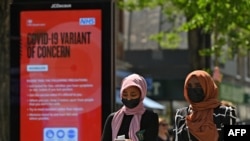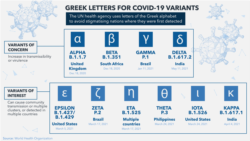South African variant? B.1.351? How about GH/501Y.V2?
Just call it beta.
The World Health Organization is assigning Greek letters to important variants of the coronavirus that causes COVID-19.
The scientific names are hard to say and hard to remember, WHO said in a statement Monday. And pinning them on the place the virus was first detected is stigmatizing and discriminatory.
Look no further than the sharp rise in anti-Asian hate crimes since the pandemic began, experts say.
After then-President Donald Trump blamed the pandemic on the "Chinese virus" in a mid-March 2020 tweet, anti-Asian hate speech on Twitter spiked, according to a study in the American Journal of Public Health. Other Republicans, including Senator Tom Cotton and Representative Louie Gohmert, picked up the rhetoric.
Attacks on people of Asian descent rose 146% in major U.S. cities between 2019 and 2020, according to the Center for the Study of Hate and Extremism at California State University, San Bernardino.
It's a pattern historians see over and over.
"Scapegoating and blame are central aspects of any epidemic," said University of Michigan medical historian Howard Markel.
In a bubonic plague outbreak in Cape Town, South Africa, in 1901, for example, low-income Black Africans were forcibly removed from their homes to a quarantine station — a precursor to the segregated Black townships of apartheid.
"Plague became an opportunity to animate segregationist and racist responses to the concerns of sanitation and hygiene within the city," Alexandre White, assistant professor of sociology and history of medicine at Johns Hopkins University, wrote on the university's website.
Plus, it's often hard to know exactly where a disease came from.
Christopher Columbus' crew may have brought syphilis back with them from North America, but "in the 1500s, the Italians called it the French disease, and the French called it the Italian disease," Markel said.
The Russians blamed the Poles. The Poles blamed the Germans. Turks called it the "Christian disease." In northern India, Muslims blamed Hindus, and Hindus blamed Muslims.
The 1918 "Spanish" flu — the last respiratory pandemic on a par with COVID-19 — did not come from Spain, Markel added. Some of the earliest known cases were reported at an Army base in Kansas, but its origins still are unclear.
Even today, Markel said, "finding patient zero only happens in storybooks."
Naming diseases
The WHO issued guidelines in 2015 for naming new diseases. In addition to advising against place names, it also recommended avoiding the names of groups of people (Legionnaires' disease) or animals (swine flu).
"This may seem like a trivial issue to some, but disease names really do matter to the people who are directly affected," Dr. Keiji Fukuda, former WHO assistant director-general for health security, said in a statement at the time.
"We've seen certain disease names provoke a backlash against members of particular religious or ethnic communities, create unjustified barriers to travel, commerce and trade, and trigger needless slaughtering of food animals. This can have serious consequences for peoples' lives and livelihoods."
Better choices include specific terms that describe symptoms. SARS (severe acute respiratory syndrome) or AIDS (acquired immune deficiency syndrome) would be good examples, though they were named before WHO devised the recommendations.
Names based on the germ that causes the disease are good, WHO said. Hence, COVID-19, short for "coronavirus disease 2019."
The first two variants of concern, which first appeared in Britain and South Africa, will go by alpha and beta, respectively. Gamma is the variant first identified in Brazil, and delta was first spotted in India.
The next letters of the Greek alphabet go to variants that WHO considers "of interest" — a step down the worry scale from the variants "of concern."
Names of plants, fruits, lost religions and made-up words were considered before WHO settled on Greek letters, according to Reuters.
Scientists will continue to use labels that describe a variant's lineage, such as B.1.1.7 or P.1.





